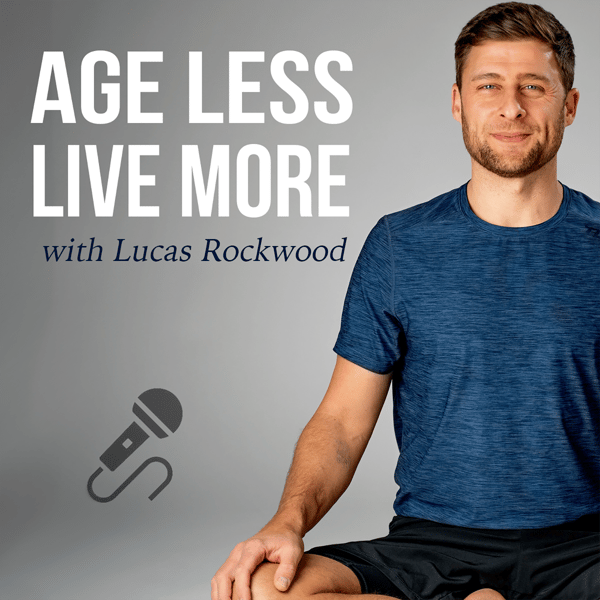497: Wearable Tech - Measure, Track, Improve with Rob ter Horst
Age Less / Live More
Lucas Rockwood
4.8 • 1.1K Ratings
🗓️ 5 January 2022
⏱️ 45 minutes
🧾️ Download transcript
Summary
Expensive watches have been a status symbol for centuries, but now, weird-looking bands have replaced the bingy Rolexes. Instead of signaling wealth, these new gizmos signal a keen interest and commitment to health. Welcome to the world of wearable health tech. On a basic level, you can track your daily steps and your heart rate. More advanced devices can track respiratory rate, HRV, body temperature, and even blood oxygen levels.
Wearable health tech has made huge strides forward recently, and many consumer devices can now hold their own with clinical-grade equipment. My guest on this week’s show is a quantified scientist who will help us learn to measure, track and improve our health.
Learn
- Best health tracker for under $100
- Best health tracker if money is not an issue
- Best sleep tracking device
- What we really know about the microbiome
- Weekly brain MRI’s
Links
Rob’s Website
ABOUT OUR GUEST
Rob ter Horst is a postdoctoral researcher who studies the immune system using bioinformatics which includes machine learning and statistics. Rob is neck deep in the quantified self movement. He measures and tracks everything in his life, a laborious task that demands 11 hours a week and includes a weekly brain MRI, sleep EEG and gut microbiome composition tests.
Nutritional Tip of the Week
- Calorie Counting
Like the Show?
- Leave us a Review on iTunes
Transcript
Click on a timestamp to play from that location
| 0:00.0 | This is the time of the year when people start new diets, new exercise routines, they begin |
| 0:09.2 | to do meditation or mindfulness routines. And inevitably when you talk to friends and families |
| 0:13.7 | on some new kick, they will be espousing all the benefits. They have more energy than ever before. |
| 0:18.4 | They're sleeping better. Their concentration is better. And we have this sunk cost fallacy |
| 0:22.8 | in this dopamine hit that happens whenever we do something new. It doesn't matter what it is. |
| 0:26.5 | Maybe it's your first time doing keto or your first time doing paleo or your first time doing |
| 0:32.0 | plant based or whatever. It might be your first time doing CrossFit. These things get us so excited |
| 0:36.5 | and then unfortunately by around Valentine's Day most people have fallen off the wagon and all |
| 0:41.6 | these reported benefits have kind of been forgotten. When we think about health and wellness, |
| 0:46.5 | I think it's really important that if you say your energy is better than ever or if you say your |
| 0:50.8 | digestion is great or your sleep is great, I think it's important that we ask compared to what. |
| 0:56.0 | And I think there has to be some kind of baseline metric that we're looking at. |
| 0:59.7 | Otherwise you'll get people who are eating 30 bananas a day. There's some guy who just eats potatoes. |
| 1:04.8 | One guy who just drinks like diet coke and they say they feel amazing. That's great if they do |
| 1:09.5 | feel amazing. But the question is, are you really amazing or are you on the verge of a catastrophic |
| 1:15.0 | health crisis? In many cases it's the latter. So whether you're on a new diet or a new exercise |
| 1:20.8 | routine or whatever it might be. In the past it's been really expensive to get any kind of data in |
| 1:25.5 | terms of where you're at. If you've ever gone to even something like direct labs and you've gone to |
| 1:29.2 | get some blood work done, it's pretty easy to drop three to five hundred dollars just to try to figure |
| 1:33.6 | out how you're doing. Metabolically speaking, probably worth doing that. But the future of health |
| 1:40.2 | and wellness I'm really convinced has to do with wearable tech, has to do with tests that we can do |
| 1:45.2 | privately, confidentially with full privacy of our phones and some cheap sensor technology. |
... |
Please login to see the full transcript.
Disclaimer: The podcast and artwork embedded on this page are from Lucas Rockwood, and are the property of its owner and not affiliated with or endorsed by Tapesearch.
Generated transcripts are the property of Lucas Rockwood and are distributed freely under the Fair Use doctrine. Transcripts generated by Tapesearch are not guaranteed to be accurate.
Copyright © Tapesearch 2025.

